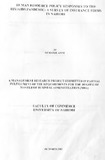| dc.description.abstract | This study set out to investigate the responses of Human Resource managers to the
HIV/AIDS pandemic. More specifically, it sought to examine and analyze the policies
that have been put in place to counter the devastating impacts of AIDS on organizations.
Broadly, the objectives of the study were to find out if any policies were in place and to
examine the content of the said policies. It also sought to identify the challenges
organizations face in implementing these policies.
The need for this study arose out of the observation that no systematic studies have been
undertaken to establish the level of response of Human Resource Managers in Kenya to
the HIV/AIDS pandemic. Little is therefore known about the mechanisms organizations
have put in place to counter the impact of HIV/AIDS and how successfully they have been
implemented. Alarming statistics also continue to be published by the UNAIDS and other
organizations on the socio-economic impact of HIV/AIDS, and more specifically their
impact on organizations.
The study was based on the assumption that since there exist sufficient policy guidelines
from the International Labour Organization (ILO), the Kenya Government and the
Federation of Kenya Employers (FKE), organizations have a proper policy framework
within which to set and implement sound workplace policies.
The study focused on insurance firms operating in Nairobi. Data was collected using a
questionnaire and follow-up in instances where some issues needed clarification. This
was done mainly with the Human Resource managers. Through a statistical analysis
programme (SPSS), frequencies and percentages were used to summarize and analyze the
data collected.
In conclusion, the findings of this study revealed that very few organizations in the
insurance industry in Kenya have sound workplace policies on HIV/AIDS. While they
offer a general medical insurance, this is not sufficient. The organizations that had
policies specific to HIV/AIDS tended to focus on education and awareness activities and
on procurement of medication for their employees. While this is a step in the right
direction, the policies ought to be more comprehensive with a multidimensional approach.
Most organizations attributed this deficiency to lack of sufficient funds. However, our
conclusion was that there is a general lack of commitment and knowledge of HIV IAIDS
among organizations in Kenya. It was the recommendation of this study that
organizations pool resources and take a more proactive stance in their fight against
HIV/AIDS. Given the ignorance of the actual cause of HIV/AIDS, the study
recommended that organizations support further research in order to establ ish the real
cause of the pandemic in order to find plausible and durable solutions. | en |

